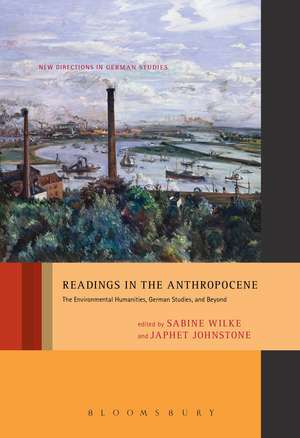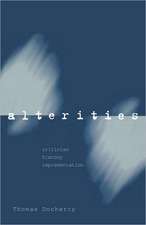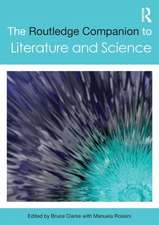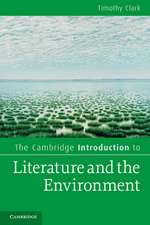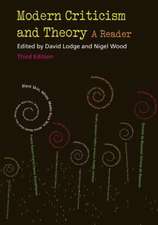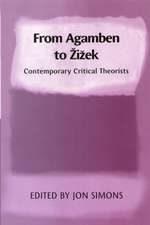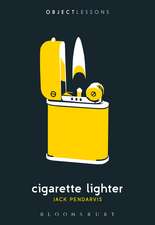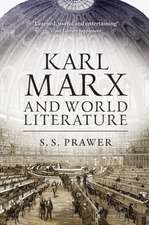Readings in the Anthropocene: The Environmental Humanities, German Studies, and Beyond: New Directions in German Studies
Editat de Professor Sabine Wilke, Dr. Japhet Johnstoneen Limba Engleză Paperback – 20 mar 2019
| Toate formatele și edițiile | Preț | Express |
|---|---|---|
| Paperback (1) | 231.81 lei 43-57 zile | |
| Bloomsbury Publishing – 20 mar 2019 | 231.81 lei 43-57 zile | |
| Hardback (1) | 716.15 lei 43-57 zile | |
| Bloomsbury Publishing – 20 sep 2017 | 716.15 lei 43-57 zile |
Din seria New Directions in German Studies
- 14%
 Preț: 183.70 lei
Preț: 183.70 lei -
 Preț: 470.90 lei
Preț: 470.90 lei - 8%
 Preț: 145.46 lei
Preț: 145.46 lei - 11%
 Preț: 219.84 lei
Preț: 219.84 lei - 23%
 Preț: 190.50 lei
Preț: 190.50 lei -
 Preț: 169.03 lei
Preț: 169.03 lei -
 Preț: 217.09 lei
Preț: 217.09 lei - 7%
 Preț: 134.49 lei
Preț: 134.49 lei - 14%
 Preț: 183.24 lei
Preț: 183.24 lei -
 Preț: 217.62 lei
Preț: 217.62 lei - 21%
 Preț: 214.78 lei
Preț: 214.78 lei - 30%
 Preț: 718.85 lei
Preț: 718.85 lei - 22%
 Preț: 237.93 lei
Preț: 237.93 lei - 22%
 Preț: 225.77 lei
Preț: 225.77 lei - 22%
 Preț: 256.77 lei
Preț: 256.77 lei - 22%
 Preț: 225.41 lei
Preț: 225.41 lei - 23%
 Preț: 222.46 lei
Preț: 222.46 lei - 30%
 Preț: 714.12 lei
Preț: 714.12 lei - 30%
 Preț: 568.22 lei
Preț: 568.22 lei - 21%
 Preț: 218.36 lei
Preț: 218.36 lei - 11%
 Preț: 218.47 lei
Preț: 218.47 lei - 13%
 Preț: 186.35 lei
Preț: 186.35 lei - 30%
 Preț: 569.94 lei
Preț: 569.94 lei - 21%
 Preț: 218.83 lei
Preț: 218.83 lei - 22%
 Preț: 256.20 lei
Preț: 256.20 lei - 14%
 Preț: 190.06 lei
Preț: 190.06 lei - 23%
 Preț: 197.14 lei
Preț: 197.14 lei - 13%
 Preț: 255.11 lei
Preț: 255.11 lei - 22%
 Preț: 226.79 lei
Preț: 226.79 lei - 30%
 Preț: 568.14 lei
Preț: 568.14 lei - 14%
 Preț: 191.85 lei
Preț: 191.85 lei -
 Preț: 183.24 lei
Preț: 183.24 lei - 22%
 Preț: 230.24 lei
Preț: 230.24 lei
Preț: 231.81 lei
Nou
Puncte Express: 348
Preț estimativ în valută:
44.36€ • 46.43$ • 36.92£
44.36€ • 46.43$ • 36.92£
Carte tipărită la comandă
Livrare economică 31 martie-14 aprilie
Preluare comenzi: 021 569.72.76
Specificații
ISBN-13: 9781501351495
ISBN-10: 1501351494
Pagini: 336
Ilustrații: 15 b/w illustrations
Dimensiuni: 140 x 216 x 19 mm
Greutate: 0.4 kg
Editura: Bloomsbury Publishing
Colecția Bloomsbury Academic
Seria New Directions in German Studies
Locul publicării:New York, United States
ISBN-10: 1501351494
Pagini: 336
Ilustrații: 15 b/w illustrations
Dimensiuni: 140 x 216 x 19 mm
Greutate: 0.4 kg
Editura: Bloomsbury Publishing
Colecția Bloomsbury Academic
Seria New Directions in German Studies
Locul publicării:New York, United States
Caracteristici
Literary scholars, philosophers, and historians explore the response of German culture to climate change and the negative impact of human activity on other species and the environment
Notă biografică
Sabine Wilke is Professor of German at the University of Washington, Seattle, USA, where she is also associated with European Studies and the Program in Critical Theory. Her research and teaching interests include modern German literature and culture, intellectual history and theory, and cultural studies. She is the author of German Culture and the Modern Environmental Imagination (2015) and editor of From Kafka to Sebald: Modernism and Narrative Form (Bloomsbury, 2012).Japhet Johnstone is project manager and translator at the University of Erlangen-Nürnberg, Germany. He is co-editor of Crimes of Passion: Representations of Sexual Pathology in the Early Twentieth Century (2015).
Cuprins
Introduction: Rethinking Literary History, Critical Reading Practices, and Cultural Studies in the AnthropoceneSabine Wilke, University of Washington, USAI. Entanglements 1. A World Without Us: Aesthetic, Literary and Scientific Imaginations of Nature beyond HumankindWolfgang Struck, University of Erfurt, Germany2. Hybrid Environments in the Anthropocene: Recent FictionCarolina Schaumann, Emory University, USA, and Heather Sullivan, Trinity University, USA3. Looking Behind Walls. Literary and Filmic Imaginations of Nature and Humanity in Haushofer's Die Wand Sabine Frost, University of Washington, USAII. Excess/Sustainability4. Care and Forethought: The Idea of Sustainability in Hegel's Practical PhilosophyKlaus Vieweg, Friedrich-Schiller-University of Jena, Germany5. Save the Forest, Burn Books: On the Science and Poetics of Sustainability in Georg Christoph Lichtenberg Markus Wilczek, Tufts University, USA6. Mocking the Anthropocene: Caricatures of Man-made Landscapes in German Satirical Magazines from the Fin de SiècleEvi Zemanek, University of Freiburg, Germany7. The Darkness of the Anthropocene: Wolfgang Hilbig's Alte Abdeckerei.Sabine Nöllgen, University of Puget Sound, USAIII. Periodization and Scale8. Immanuel Kant, the Anthropocene, and the Idea of Environmental CosmopolitanismAmos Nascimento, University of Washington Tacoma, USA9. Adalbert Stifter and the Gentle AnthropoceneSean Ireton, University of Missouri, USA10. Engineering the Anthropocene: Technology, Ambition, and Enlightenment in Theodor Storm's Der SchimmelreiterKatie RitsonIV. Diffusion, the Lithic, and a Planetary Praxis11. Petrifiction: Reimagining the Mine in German RomanticismJason Groves, San Francisco State University, USA12. The Anthroposcene of Literature: Diffuse Dwelling in Graham Swift and W.G. SebaldBernhard Malkmus, Ohio State University, USA13. Planetary Praxis in the Anthropocene: An Ethics and Poetics for a New Geological AgeSabine Wilke, University of Washington, USAEpilogue: The Anthropocene in German PerspectiveAxel Goodbody, University of Bath, UKBibliographyIndex
Recenzii
The thirteen interdisciplinary essays assembled in this volume demonstrate that transatlantic German Studies scholars are at the forefront of cultural studies research on the Anthropocene . The contributors . offer innovative examinations of German-language literature, film, photography, philosophy, illustrated periodicals, critical theory, and locations. . The re-interpretation of canonical nineteenth-century literature makes this volume shine. . I highly recommend Wilke and Johnstone's Readings in the Anthropocene. The volume is essential reading for specialists and broader audiences conducting cultural studies research and living ethically in the Anthropocene.
Readings in the Anthropocene provides a timely collection of transdisciplinary essays on literary, historical and philosophical texts, films, artworks and caricatures in German studies within the broader fields of ecocriticism and environmental humanities from the eighteenth century until today. Scrutinizing the concept of the Anthropocene, the volume analyses the manifold interactions between the human and non-human world and encourages new thinking toward a sustainable future.
What do Kant, Hegel, Romantic poets and Naturphilosophen, as well as contemporary German writers and artists have to say about the Anthropocene? The answer to this question is at the core of this rich collection, superbly assembled by Sabine Wilke and Japhet Johnstone. Insightful, deeply researched, and elegantly written, the essays of Readings in the Anthropocene not only remind us that many of the concepts we use-ecology, the "Faustian" delusions of anthropocentrism-find their roots in the German imagination, but also show how intensely that imagination continues to enrich the whole discourse of the environmental humanities.
This excellent volume is distinguished by its cross-disciplinary reach, historical depth, and the considered attention that it brings to the conceptual and poetological, material and moral challenges of living in the Anthropocene. For the seasoned Germanist, there are plenty of welcome surprises here, for instance concerning Kant's eco-cosmopolitanism, the comic questioning of techno-optimism in fin-siècle satirical magazines, or the dark ecology of many recent German literary and visual narratives. Yet in addition to advancing environmental approaches within German Studies, Readings in the Anthropocene will contribute substantially to the internationalisation of the environmental humanities, providing ample evidence of the signal importance of German-language thought, literature, film and cultural history to this burgeoning transdisciplinary field.
Readings in the Anthropocene provides a timely collection of transdisciplinary essays on literary, historical and philosophical texts, films, artworks and caricatures in German studies within the broader fields of ecocriticism and environmental humanities from the eighteenth century until today. Scrutinizing the concept of the Anthropocene, the volume analyses the manifold interactions between the human and non-human world and encourages new thinking toward a sustainable future.
What do Kant, Hegel, Romantic poets and Naturphilosophen, as well as contemporary German writers and artists have to say about the Anthropocene? The answer to this question is at the core of this rich collection, superbly assembled by Sabine Wilke and Japhet Johnstone. Insightful, deeply researched, and elegantly written, the essays of Readings in the Anthropocene not only remind us that many of the concepts we use-ecology, the "Faustian" delusions of anthropocentrism-find their roots in the German imagination, but also show how intensely that imagination continues to enrich the whole discourse of the environmental humanities.
This excellent volume is distinguished by its cross-disciplinary reach, historical depth, and the considered attention that it brings to the conceptual and poetological, material and moral challenges of living in the Anthropocene. For the seasoned Germanist, there are plenty of welcome surprises here, for instance concerning Kant's eco-cosmopolitanism, the comic questioning of techno-optimism in fin-siècle satirical magazines, or the dark ecology of many recent German literary and visual narratives. Yet in addition to advancing environmental approaches within German Studies, Readings in the Anthropocene will contribute substantially to the internationalisation of the environmental humanities, providing ample evidence of the signal importance of German-language thought, literature, film and cultural history to this burgeoning transdisciplinary field.
